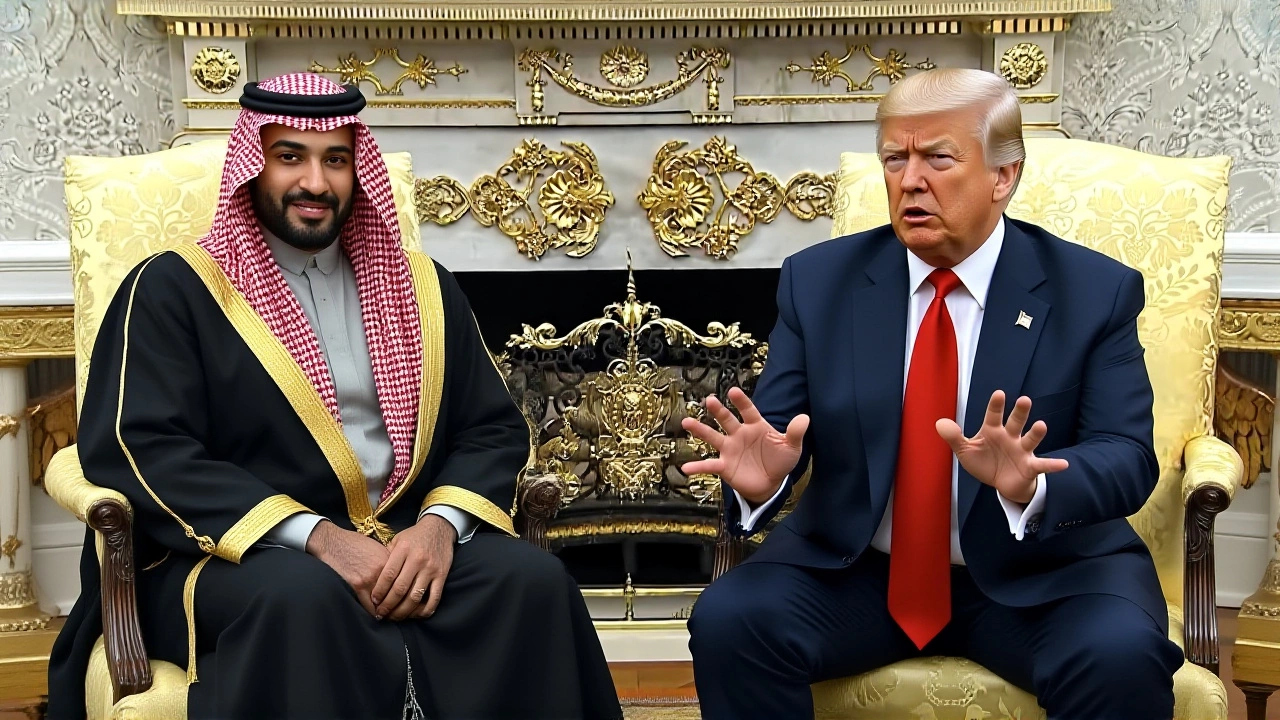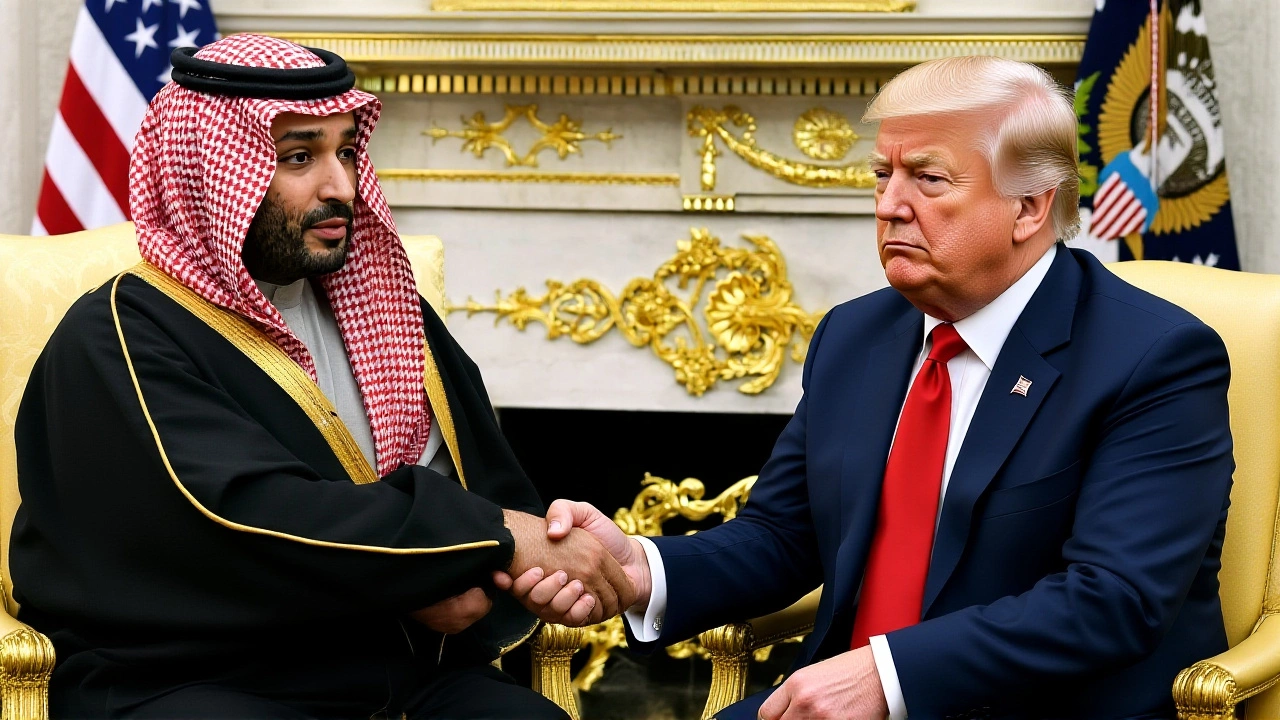When Donald J. Trump welcomed Mohammed bin Salman to the White House for an Oval Office meeting, the air wasn’t just thick with diplomatic protocol—it was heavy with unresolved bloodshed. Just hours before, Congress had passed legislation triggering a 30-day countdown to the public release of the long-sealed Epstein files, documents that could expose powerful names tied to the late convicted sex offender Jeffrey Edward Epstein. But the moment that dominated the room wasn’t about justice for victims—it was about a murder in Istanbul, and whether the U.S. president would hold a foreign prince accountable.
A President’s Reversal and a Prince’s Defense
The ABC News reporter didn’t mince words. Addressing Mohammed bin Salman as "Your loyal highness," the journalist laid out the CIA’s 2018 assessment: that the Saudi crown prince personally approved the October 2, 2018, killing of Jamal Ahmed Khashoggi, a Washington Post columnist and U.S. permanent resident. "9/11 families are furious that you are here," the reporter added, referencing the decades-long legal battles by victims’ relatives who believe Saudi officials aided the 2001 attacks. Donald J. Trump didn’t hesitate. "I’ve known him for a long time," he said, brushing off the CIA’s findings. "He’s a strong leader. We have important business together." Mohammed bin Salman offered a more subdued response: "It was painful and a huge mistake," he admitted, "and Saudi Arabia did all the right steps afterwards." But he offered no details—no prosecutions, no timeline, no transparency. Just words.The Shadow of Khashoggi and the Weight of U.S. Policy
The CIA’s 2018 conclusion—that Mohammed bin Salman ordered Khashoggi’s assassination inside the Saudi consulate in Istanbul—wasn’t a rumor. It was based on intercepted communications, forensic evidence, and witness testimony. The Saudi government initially denied everything. Then, under global pressure, they admitted Khashoggi was killed—but blamed 18 rogue agents. Seven were sentenced, five to death, in a trial widely condemned as a sham. The Trump administration, despite public pressure, refused to sanction the crown prince himself. Only 17 lower-level officials were sanctioned in November 2018. Now, with Donald J. Trump back in the political spotlight, the same logic appears to be resurfacing: oil, arms deals, and geopolitical alignment outweigh moral clarity. The Biden administration, in February 2021, declassified an intelligence report reaffirming the CIA’s original conclusion. Yet even then, no sanctions were imposed on Mohammed bin Salman.The Epstein Files: A Looming Explosion
While the world watched the Oval Office exchange, another bomb was ticking. Congress passed legislation mandating the declassification of the Epstein files—a collection of documents from the FBI and DOJ investigations into Epstein’s sex trafficking ring. The 30-day countdown began immediately after passage. That means by late June, the public will see names, emails, flight logs, and financial records tied to Epstein’s inner circle. Epstein, who died by suicide in the Manhattan Metropolitan Correctional Center on August 10, 2019, was never tried for the full scope of his crimes. His network allegedly included politicians, billionaires, and celebrities. Victims’ advocates have waited five years for this moment. "This isn’t just about Epstein," said one former prosecutor familiar with the case. "It’s about who protected him. Who looked away. Who enabled him. The files will show us who had the power to stop it—and didn’t."
The Bridge That Fell Without a Warning
Amid these political storms, another tragedy surfaced with chilling new details. On March 26, 2024, the Francis Scott Key Bridge in Baltimore collapsed after being struck by the container ship Dali, operated by Synergy Marine Group. Six workers from Brawner Builders Inc. died instantly. New findings from the National Transportation Safety Board reveal these workers had no warning—despite having up to 90 seconds to escape after the ship hit the bridge’s support pier. The Maryland Transportation Authority, which managed the bridge, has not explained why emergency alerts weren’t triggered. "It’s not just a failure of infrastructure," said a former NTSB investigator. "It’s a failure of human systems. Someone knew the ship was losing power. Someone should have sounded the alarm."What Comes Next?
The Epstein files will drop in late June. The world will watch. Will names like politicians, financiers, or celebrities emerge? Will Congress demand new investigations? Will victims finally get closure? Meanwhile, the Mohammed bin Salman-Donald J. Trump alliance signals a troubling continuity in U.S. foreign policy: accountability is optional when profits are high. The Khashoggi case remains open in the court of global opinion. And the six workers in Baltimore? Their families are still waiting for answers.Frequently Asked Questions
Why is the release of the Epstein files such a big deal?
The Epstein files contain thousands of pages of evidence from FBI and DOJ investigations, including flight logs, financial records, and victim testimonies that could reveal connections between Epstein and powerful figures in politics, finance, and entertainment. Many victims have waited over five years for transparency, and the documents may trigger new criminal probes or civil lawsuits against enablers.
What did the CIA conclude about Mohammed bin Salman and Khashoggi’s murder?
In November 2018, the CIA assessed with high confidence that Mohammed bin Salman personally approved the operation to kill Jamal Ahmed Khashoggi. This conclusion was based on intercepted communications, forensic evidence from the consulate, and testimony from Saudi insiders. The Biden administration reaffirmed this finding in a 2021 declassified report.
Why did Trump reverse his position on the Epstein files?
Trump’s administration previously blocked the release of the Epstein files through legal maneuvers and executive pressure. His sudden reversal likely stems from mounting public pressure, congressional momentum, and the political cost of continuing to obstruct. With the 2024 election looming, appearing to side with victims may be strategically advantageous, even if his past actions contradict it.
Why didn’t workers on the Francis Scott Key Bridge get a warning?
The National Transportation Safety Board found that although the ship Dali lost power and began drifting toward the bridge at 1:29 a.m., no emergency alert was triggered to the construction crew working on the bridge. The Maryland Transportation Authority has not explained why automated systems or human monitors failed to activate alarms, despite having roughly 90 seconds between impact and collapse.
Has Saudi Arabia ever been held accountable for Khashoggi’s murder?
Saudi Arabia convicted eight individuals in a closed trial, sentencing five to death (later commuted) and three to prison terms. But no one above the level of mid-level officials was prosecuted. The crown prince, who the CIA says ordered the killing, remains uncharged and un-sanctioned by the U.S. government despite bipartisan congressional calls for accountability.
What’s the connection between the Epstein files and the Khashoggi meeting?
The timing is no coincidence. While the public prepares to learn who protected a sex trafficker, the president is embracing a foreign leader accused of orchestrating a journalist’s murder. Both cases reflect a pattern: powerful institutions protect the powerful, and justice is delayed—or denied—until public pressure becomes too loud to ignore.
